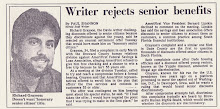
The
Brooklyn Literary Review in its fifth issue (1983) reviews Richard Grayson’s
I Brake for Delmore Schwartz:
I Brake for Delmore Schwartz
by Richard Grayson
(Zephyr Press)Here is a slim collection of fifteen short stories, the fifth collection to be published by Richard Grayson. The style is experimental and occasionally novel.
Grayson respects the traditional approach to writing fiction: the well-wrought stories wherein every word counts. However, his education, two years of fiction writing at Brooklyn College culminating in an MFA, emphasized the experimental, and his own fictions as a result are both structured and fragmented. Such stories as “The Autobiography of William Henry Harrison’s Cold” and “Oh Khrushchev, My Khrushchev” are well-structured, and appeal to the reader on the strength of their novelty. Others are fragmented and spatial like “Different Places” and “That’s Saul, Folks.” These stories appeal too because they capture the rhythms of modern life and play them back faithfully.
Grayson’s themes are the themes of the twentieth century. The theme of isolation abounds in “Hold Me,” where the author comments, “I am living in a place with strangers. Even my family are strangers now.” Other themes covered include the disintegration of the family, helplessness, and sexual indecisiveness.
The writing is often confessional. Grayson approaches writing as a form of self-analysis through which he hopes not only to understand himself, but humanity as well. Here he only partially succeeds, because at the book’s end the reader is left with more insights into Grayson than into the world at large. Nevertheless, the writing throughout is crisp and honest, and the style versatile, making the collection worth reading.
—Tom Lane















